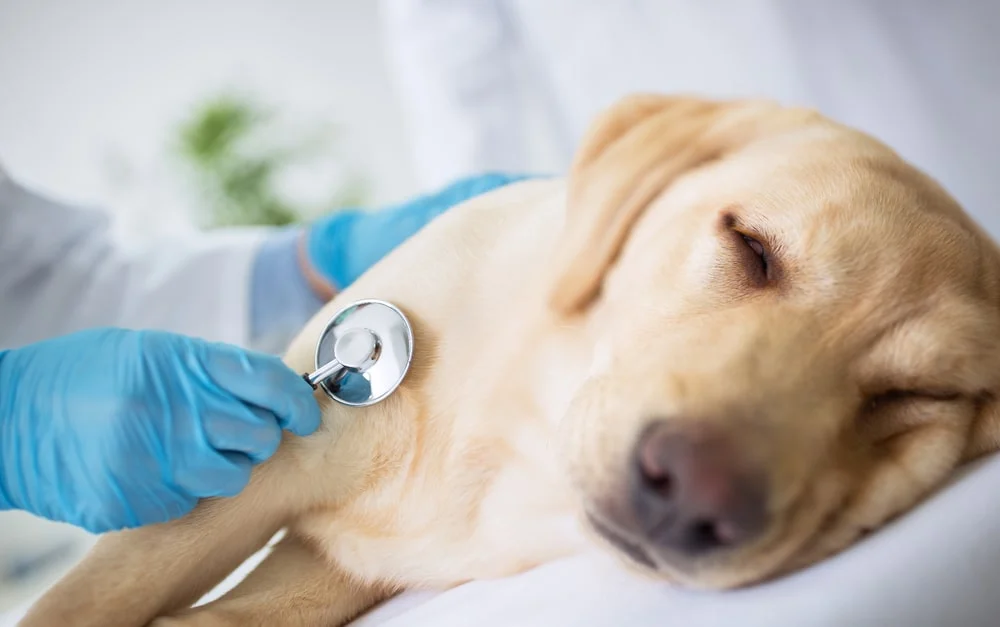PET HEALTH
Pneumonia is a type of dog disease that causes inflammation of the respiratory system.1 It’s important to learn about canine pneumonia so you can recognize any signs of the condition in your dog. Let’s talk about the types of pneumonia, symptoms to look out for, and how dog insurance can help cover costs related to pneumonia.
Pneumonia May Hurt Your Dog and Your Wallet
Pet Insurance Can Help
What Is Pneumonia in Dogs?
Canine pneumonia is inflammation of the lower respiratory tract or lungs in dogs. This inflammation makes breathing difficult and causes an oxygen deficiency in the blood. Your dog could develop pneumonia in a few different ways. And your dog may be more susceptible to developing the disease if they have had other illnesses that damaged their airways.1
How Do Dogs Get Pneumonia?
There are a few common types of pneumonia in dogs, and each has an underlying cause. Often, dogs get pneumonia as a secondary illness after they have had a virus.2 Other times, breathing in certain irritants can cause pneumonia directly.1
Bacterial pneumonia
Bacterial pneumonia, also known as viral or infectious pneumonia, is the most common type of pneumonia in dogs. Dogs with this type of pneumonia will develop it after inhaling bacteria or dealing with another illness in the lower respiratory tract.1 Some diseases that could cause your pup to develop bacterial pneumonia include:1,2
- Distemper
- Adenovirus (types 1 and 2)
- Canine influenza
- Parainfluenza
- Parasites
If your dog is diagnosed with any of the above illnesses, be sure to pay special attention to any signs of pneumonia that may develop.
Aspiration pneumonia
Aspiration pneumonia occurs when a dog inhales a foreign solid or liquid into their lungs. These could be food, vomit, or another substance. For example, if you give your dog liquid medication and don’t administer it properly, your dog could breathe it in and develop pneumonia.1
The prognosis for aspiration pneumonia is poor, so prevention is key. Also, acting quickly if you think your dog has inhaled a foreign substance is important. In such cases, many vets will prescribe antibiotics without waiting for symptoms of pneumonia to appear.1
Fungal pneumonia
If your dog inhales fungus, they could end up with fungal pneumonia. While fungi can be spread from one animal to another, spores in soil are the source of most cases of fungal pneumonia. Compared to bacterial and aspiration pneumonia, fungal pneumonia usually takes longer to develop and may be harder to diagnose.1
Symptoms of Pneumonia in Dogs
Signs of pneumonia in dogs may include:1
- Nasal discharge
- Weight loss
- Difficulty breathing
- Loss of appetite
- Blue gums
- Lethargy or fatigue
- Coughing spells
- Fever
Get in touch with your vet immediately if your dog shows any of these symptoms.
How Vets Diagnose Canine Pneumonia
When you notice your dog showing signs of pneumonia, it’s important to take them to the vet as soon as possible. Cases of pneumonia that go untreated may lead to further complications and the need for a stay in the animal hospital. Your veterinarian may want to perform a physical examination, chest X-ray, a bacterial culture, and blood work. They’ll also want to discuss your dog’s medical history to get a better idea of their symptoms.1
How To Treat Pneumonia in Dogs
Once your vet diagnoses your dog with pneumonia, treatment will focus on supplementing their oxygen and treating any underlying disease or fungal infection with the right medication. Your pooch may also need a bronchodilator to open their airways.2 Depending on the type of pneumonia and the severity of inflammation, your dog may need extended drug therapy and follow-up radiographs to monitor their condition.1,2
Recovery at home
After your vet visit, you can help keep your dog comfortable by giving them all medications on the proper schedule. You should ensure your dog has a warm, dry environment as they heal.1 Be sure to attend all follow-up appointments with your vet.
Frequently Asked Questions
Now that you know a little more about pneumonia in dogs, let’s cover some frequently asked questions.
Is pneumonia contagious in dogs?
Unfortunately, yes. Certain viruses and bacteria that lead to pneumonia — such as distemper and canine influenza — are contagious, so your dog could catch them from another dog and develop pneumonia.3
What is the dog pneumonia survival rate?
The survival rate depends on the type of pneumonia and severity of inflammation. In general, 77% – 94% of dogs and cats that are diagnosed with pneumonia are discharged from the hospital.4
What is the dog pneumonia recovery time?
Pneumonia recovery times for your pooch depend on pneumonia type and severity. With fungal pneumonia, several months of antifungal drug therapy may be necessary to reach full recovery.1 For aspiration pneumonia, treatment can take between 2 – 8 weeks, depending on the exact underlying cause.5 For bacterial pneumonia, the timetable could depend on how long it takes your dog to recover from an underlying virus.
How much does it cost to treat pneumonia in dogs?
Treating pneumonia in your dog may come with a cost. For instance, oxygen therapy can cost between $800 – $3,000.6 X-rays may also tack on another expense (around $150 – $250), and if your pup needs hospitalization, that could cost between $800 – $1,500 per night.6,7 Don’t forget about the costs of the vet visits themselves and any medications your dog may need.
MetLife Pet Could Help You Cover Dog Pneumonia Costs
If you can’t swing the treatment out of pocket, pet insurance may help you cover the costs — even if your dog is hospitalized.
Trixie, a Westie from Virginia, was diagnosed and treated for pneumonia — and she had to be hospitalized. In total, the bill for Trixie’s hospitalization and treatment was about $9,400, but MetLife Pet covered almost $8,300.8
MetLife Pet could help you cover unexpected vet bills that come your way. Fetch a quote to get started.


